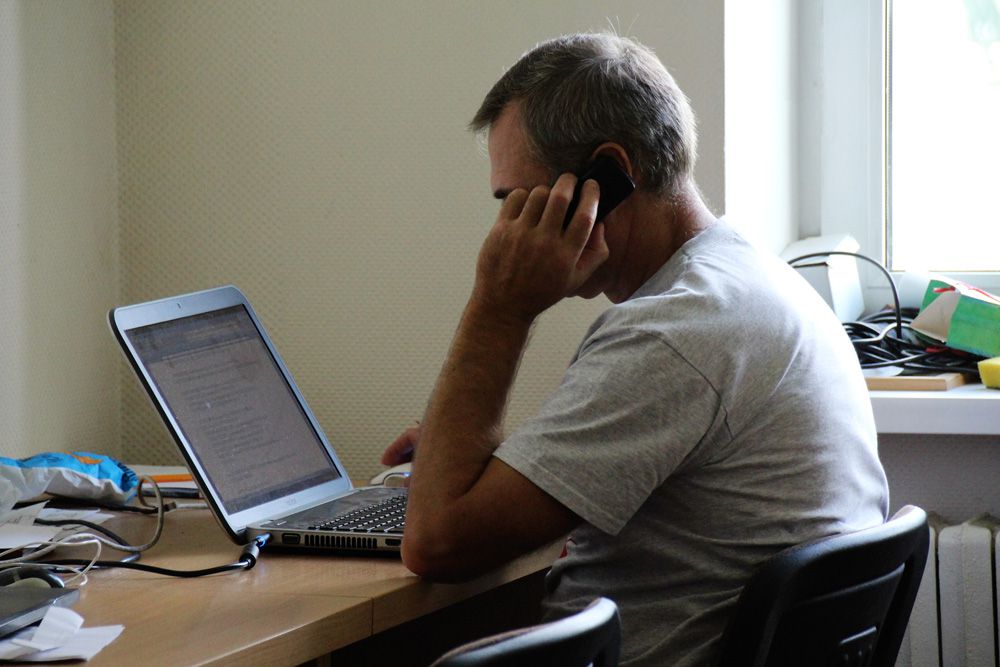September 8 is the International Day of Solidarity of Journalists. This day represents solidarity between all media workers and their independence from politics. However many journalists still work under unsafe conditions, and Belarus is no exception.
Journalists do not have an easy time in Belarus. State-owned media are a mouthpiece for the government. Independent or opposition media work under difficult conditions, often repressed by the authorities. "There are no positive developments in journalistic rights. Independent media just try to survive", says Ales Antsipenka from the Belarusian Association of Journalists (BAJ).
In the World Press Freedom Index 2016, published by Reporters Without Borders, Belarus ranks 157 out of 180. The main problems are restricted access to information, state censorship and obligatory accreditation for freelance journalists. Some journalists have had to pay fines for working without accreditation, already in 2016 nine journalists have been arrested for their work.
A case publicised countrywide is that of Eduard Palchys, who wrote under the name of "Jhon Silver" on his blog 1863x.com. Palchys criticised the Belarusian government as well as Russia's actions in Crimea. The authorities accused him of inciting hatred and of producing and distributing pornographic materials. Antsipenka expects "that Palchys will be detained for several years".
According to the Ministry of Information, 728 newspapers, 174 radio stations, 100 TV stations and nine information agencies are registered in Belarus. Even though the majority of newspapers is not owned by the state, most broadcasters avoid reporting on political issues. The same applies to private TV and radio stations.
Independent radio and TV stations are mostly based abroad, such as Radyjo Razyja or Belsat TV. Belsat broadcasts mainly in Belarusian and has a regular audience of 600,000, according to the head of the Belarusian office of Belsat, Alaksej Minchonak. The headquarters are located in Warsaw as part of the Polish state-run Telewizja Polska (TVP), although there are branches in Belarus - illegal of course. Visiting one of their offices in Minsk might lead you to a nondescript apartment building, with no indications that the company is based there.
Online media also provide an important source of information. However, anti-governmental blogs and news outlets, such as Charter '97, are blocked periodically. TUT.BY is the biggest and most popular online information platform in Belarus. They consider themselves to be neutral. Editor-in-chief Maryna Zolatava explains that TUT.BY is financed by advertising and as a hosting service for other websites, without receiving any other funding.
In general, TUT.BY does not have many problems with the Belarusian authorities. Zolatava admits that it is difficult to get access to some information and sometimes people from the ministries call and ask why an article was so negative towards them. But there is also the recent case of Pavel Dabravolski. At the beginning of 2016 the TUT.BY journalist was detained and beaten up by the police while working. Instead of opening an investigation into this incident, the authorities fined him following a short trial.
Asked about the situation of press freedom in Belarus, Zolatava answers: "Press freedom does not exist. Maybe the situation in Belarus is worse than elsewhere, but even in Scandinavia they have their problems." TUT.BY Political Editor Artiom Schraibman adds: "There is nothing like independent media. You are always dependent on your owner and the money. If media are biased, what is a free press good for?", he asks rhetorically.
Media coverage during the electionsFor the upcoming parliamentary elections BAJ has been monitoring media coverage. State-run media are mainly criticised for not mentioning candidates' names and times of TV or radio appearances. Opposition candidates are effectively non-existent for them. TUT.BY is praised in the report for its balanced approach. "We try to include pro-governmental parties, but they are less open to media than opposition parties", comments Shraibman.
The pro-governmental Belarusian Union of Journalists (BSJ) published its own report, noting that in state-run media everything is fine and "in accordance with current legislation". According to BSJ, independent media focus on oppositional candidates and report negatively about the government. For them the work of the state media is an expression of the free character of the elections.
Schraibman compares Belarusian politics to a fantasy world that has nothing in common with classical politics from Western countries. "I just try to show my audience that there should be a political contest during the elections", he states. But Shraibman also admits that "the results are already clear."
Original

